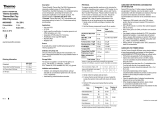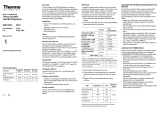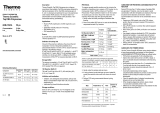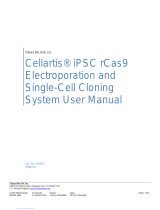Page is loading ...

PRODUCT INFORMATION
Pfu DNA Polymerase,
native
Pub. No. MAN0012888
Rev. Date 3 June 2016 (B.00)
Concentration: 2.5 U/µL
Lot: __ Expiry Date: __
Store at -20°C
www.thermofisher.com
For Research Use Only. Not for use in diagnostic procedures.
Ordering Information
Pfu DNA polymerase (native)
Component
#EP0571
100 U
#EP0572
500 U
Pfu DNA polymerase, native, 2.5 U/µL
100 U
500 U
10X Pfu Buffer with MgSO4
0.6 mL
2x1.25 mL
10X Pfu Buffer
0.6 mL
2x1.25 mL
25 mM MgSO4
0.6 mL
2x1.25 mL
DESCRIPTION
Thermo Scientific ™Pfu DNA Polymerase is a highly
thermostable DNA polymerase from the
hyperthermophilic archaeum Pyrococcus furiosus. The
enzyme catalyzes the template-dependent polymerization
of nucleotides into duplex DNA in the 5’3’ direction.
Pfu DNA Polymerase also exhibits 3’5’ exonuclease
(proofreading) activity, which enables the polymerase to
correct nucleotide incorporation errors. It has no 5’3’
exonuclease activity and no detectable reverse
transcriptase activity.
The error rate of Pfu DNA Polymerase in PCR is 2.6x10-6
errors per nt per cycle, as determined by the modified
method described in (1).
Note. dUTP, dITP and primers containing these
nucleotides should not be used in PCR with Pfu DNA
Polymerase because the binding of this enzyme to DNA
templates with uracil and hypoxanthine stalls DNA
synthesis (2,3).
Applications
High fidelity PCR.
Generation of PCR products for cloning and
expression.
RT-PCR for cDNA cloning and expression.
Generation of PCR product for blunt-end cloning (4).
Site-directed mutagenesis.
Source
Pyrococcus furiosus
Definition of Activity Unit
One unit of the enzyme catalyzes the incorporation of
10 nmol of deoxyribonucleotides into a polynucleotide
fraction in 30 min at 72°C.
Enzyme activity is assayed in the following mixture:
20 mM Tris-HCl (pH 8.8 at 25°C), 2 mM MgSO4,
10 mM (NH4)2SO4, 10 mM KCl, 0.1 mg/mL BSA,
0.1% (v/v) Triton X-100, 0.75 mM activated salmon milt
DNA, 0.2 mM of each dNTP, 0.4 MBq/mL [3H]-dTTP.
Storage Buffer
The enzyme is supplied in: 20 mM Tris-HCl (pH 8.2),
1 mM DTT, 0.1 mM EDTA, 100 mM KCl,
0.1% (v/v) Nonidet P40, 0.1% (v/v) Tween 20 and
50% (v/v) glycerol.
10X Pfu Buffer with 20 mM MgSO4
200 mM Tris-HCl (pH 8.8 at 25°C), 100 mM (NH4)2SO4,
100 mM KCl, 1 mg/mL BSA, 1% (v/v) Triton X-100,
20 mM MgSO4.
10X Pfu Buffer
200 mM Tris-HCl (pH 8.8 at 25°C), 100 mM (NH4)2SO4,
100 mM KCl, 1% (v/v) Triton X-100, 1 mg/mL BSA.
Inhibition and Inactivation
Inactivated by gel purification or phenol/chloroform
extraction.
PROTOCOL
To prepare several parallel reactions and to minimize the
possibility of pipetting errors, prepare a PCR master mix
by mixing water, buffer, dNTPs, primers and template
DNA. Pfu DNA Polymerase should be the last component
added. Prepare sufficient master mix for the number of
reactions plus one extra to allow for pipeting error.
1. Gently vortex and briefly centrifuge all solutions after
thawing.
2. Place a thin-walled PCR tube on ice and add the
following components for each 50 µL reaction:
Water, nuclease-free (#R0581)
variable
10X Pfu Buffer with MgSO4*
5 µL
dNTP Mix, 2 mM each (#R0241)
5 µL (0.2 mM of each)
Forward primer
0.1-1.0 µM
Reverse primer
0.1-1.0 µM
Template DNA
50 pg - 1 µg
Pfu DNA Polymerase
1.25-2.5 U
Total volume
50 µL
*If using 10X Pfu Buffer without MgSO4, a 25 mM MgSO4
solution should be added to 50 µL of the master mix:
Final
concentration
of MgSO4, mM
1
1.25
1.5
1.75
2
2.5
3
4
Volume of
25 mM MgSO4, µL
2
2.5
3
3.5
4
5
6
8
3. Gently vortex the samples and spin down.
4.
If using a thermal cycler that does not use a heated lid,
overlay the reaction mixture with 25 µL of mineral oil.
5. Perform PCR using the following thermal cycling
conditions:
Step
Temperature,
°C
Time
Number of
cycles
Initial denaturation
95
1-3 min
1
Denaturation
95
30 s
25-35
Annealing
Tm-5
30 s
Extension
72
2 min/kb
Final extension
72
5-15 min
1
GUIDELINES FOR PREVENTING
CONTAMINATION OF PCR REACTION
During PCR more than 10 million copies of template DNA
are generated. Therefore, care must be taken to avoid
contamination with other templates and amplicons that
may be present in the laboratory environment. General
recommendations to lower the risk of contamination are
as follows:
Prepare your DNA sample, set up the PCR mixture,
perform thermal cycling and analyze PCR products in
separate areas.
Set up PCR mixtures in a laminar flow cabinet
equipped with an UV lamp.
Wear fresh gloves for DNA purification and reaction
set up.
Use reagent containers, dedicated for PCR. Use
positive displacement pipettes, or pipette tips with
aerosol filters to prepare DNA samples and perform
PCR set up.
Use PCR-certified reagents, including high quality
water (e.g., Water, nuclease-free, #R0581).
Always perform “no template control” (NTC) reactions
to check for contamination.
Carryover contamination control in conjunction with
UDG is not applicable using Pfu DNA Polymerase.
GUIDELINES FOR PRIMER DESIGN
Use the Thermo Scientific REviewer primer design
software at www.thermofisher.com /reviewer or follow
general recommendations for PCR primer design as
outlined below:
PCR primers are generally 20-30 nucleotides long.
Optimal GC content of the primer is 40-60%. Ideally,
C and G nucleotides should be distributed uniformly
along the primer.
Avoid placing more than three G or C nucleotides at
the 3’-end to lower the risk of non-specific priming.
If possible, the primer should terminate with a G or C
at the 3’-end.
Avoid self-complementary primer regions,
complementarities between the primers and direct
primer repeats to prevent hairpin formation and primer
dimerization.
(continued on reverse page)

The 3’5’ exonuclease activity associated with Pfu
DNA Polymerase may degrade the primers. It is
therefore important that Pfu DNA Polymerase be
added last to the reaction mixture. Use the longer
primers (20-30 bp) with higher CG content.
Check for possible sites of undesired complementarity
between primers and template DNA.
When designing degenerate primers, place at least
3 conservated nucleotides at the 3’-end.
Differences in melting temperatures (Tm) between the
two primers should not exceed 5°C.
Estimation of primer melting temperature
For primers containing less than 25 nucleotides, the
approx. melting temperature (Tm) can be calculated
using the following equation:
Tm = 4 (G + C) + 2 (A + T),
where G, C, A, T represent the number of respective
nucleotides in the primer.
If the primer contains more than 25 nucleotides
specialized computer programs e.g., REviewer™
(www.thermofisher.com /reviewer) are recommended to
account for interactions of adjacent bases, effect of salt
concentration, etc.
COMPONENTS OF THE REACTION MIXTURE
Template DNA
Optimal amounts of template DNA in the 50 µL reaction
volume are 0.05-1 ng for both plasmid and phage DNA,
and 0.1-1 µg for genomic DNA. Higher amounts of
template increase the risk of generating of non-specific
PCR products. Lower amounts of template reduce the
accuracy of the amplification.
All routine DNA purification methods are suitable for
template preparation e.g.,Thermo Scientific™
GeneJET™ Genomic DNA Purification Kit (#K0721) or
Thermo Scientific™ GeneJET™ Plasmid Miniprep Kit
(#K0502). Trace amounts of certain agents used for DNA
purification, such as phenol, EDTA and proteinase K, can
inhibit DNA polymerase. Ethanol precipitation and
repeated washes of the DNA pellet with 70% ethanol
normally remove trace contaminants from DNA samples.
MgSO4 concentration
Pfu DNA Polymerase is provided with an optimized
10X Pfu Buffer which includes MgSO4 at a concentration
of 20 mM. A final MgSO4 concentration of 2 mM is
generally ideal for PCR. The MgSO4 concentration can
be optimised by using 10X Pfu Buffer and MgSO4
solution provided in a separate vial. If the DNA samples
contain EDTA or other metal chelators, the Mg2+ ion
concentration in the PCR mixture should be increased
accordingly (1 molecule of EDTA binds one Mg2+).
dNTPs
The recommended final concentration of each dNTP is
0.2 mM. In certain PCR applications, higher dNTP
concentrations may be necessary. Due to the binding of
Mg2+ to dNTPs, the MgSO4 concentration needs to be
adjusted accordingly. It is essential to have equal
concentrations of all four nucleotides (dATP, dCTP,
dGTP and dTTP) present in the reaction mixture.
To achieve 0.2 mM concentration of each dNTP in the
PCR mixture, use the following volumes of dNTP mixes:
Volume of
PCR mixture
dNTP Mix,
2 mM each
(#R0241)
dNTP Mix,
10 mM each
(#R0191)
dNTP Mix,
25 mM each
(#R1121)
50 µL
5 µL
1 µL
0.4 µL
25 µL
2.5 µL
0.5 µL
0.2 µL
20 µL
2 µL
0.4 µL
0.16 µL
Primers
The recommended concentration range of the PCR
primers is 0.1-1 µM. Excessive primer concentrations
increase the probability of mispriming and generation of
non-specific PCR products. For degenerate primers and
primers used for long PCR higher primer concentrations
in the range of 0.3-1 µM are often favorable.
CYCLING PARAMETERS
Initial DNA denaturation
It is essential to completely denature the template DNA at
the beginning of PCR to ensure efficient utilization of the
template during the first amplification cycle. If the GC
content of the template is 50% or less, an initial 1-3 min
denaturation at 95°C is sufficient. For GC-rich templates
this step should be prolonged up to 10 min.
Denaturation
A DNA denaturation time of 30 seconds per cycle at
95°C is normally sufficient. For GC-rich DNA templates,
this step can be prolonged to 3-4 min.
Primer annealing
The annealing temperature should be 5°C lower than the
melting temperature (Tm) of the primers. Annealing for
30 seconds is normally sufficient. If non-specific PCR
products appear, the annealing temperature should be
optimized stepwise in 1-2°C increments.
Extension
The optimal extension temperature for Pfu DNA
Polymerase is 70-75°C. The recommended extension
step is 2 min/kb at 72°C for PCR products up to 2 kb. For
larger products, the extension time should be prolonged
by 1 min/kb.
Number of cycles
The number of cycles may vary depending on the amount
of template DNA in the PCR mixture and the expected
PCR product yield.
In most cases, 25-35 cycles are sufficient.
Final extension
After the last cycle, it is recommended to incubate the
PCR mixture at 72°C for additional 5-15 min to fill-in any
possible incomplete reaction products.
Troubleshooting
For troubleshooting please visit www.thermofisher.com
CERTIFICATE OF ANALYSIS
Endodeoxyribonuclease Assay
No detectable degradation was observed after incubation
of supercoiled plasmid DNA with Pfu DNA polymerase.
Exodeoxyribonuclease Assay
No detectable degradation was observed after incubation
of single stranded and double stranded radiolabeled
oligonucleotides with enzyme.
Functional Assay
Pfu DNA Polymerase was tested for amplification of
950 bp single copy gene from human genomic DNA.
Quality authorized by: Jurgita Zilinskiene
References
1. Lundberg, K.S., et al., High-fidelity amplification
using a thermostable DNA polymerase isolated from
Pyrococcus furiosus, Gene, 108, 1-6, 1991.
2. Shuttleworth, G., et al., Recognition of the pro-
mutagenic base uracil by family B DNA polymerases
from Archaea, J.Mol. Biol., 337, 621-634, 2004.
3. Gruz, P., et al., Processing of DNA lesions by
archaeal DNA polymerases from Sulpholobus
solfataricus, Nucleic Acids Res., 31, 4024-4030,
2003.
4. Sambrook, J., Russell, D.W., Molecular Cloning: A
Laboratory Manual, the third edition, Cold Spring
Harbor Laboratory Press, Cold Spring Harbor, New
York, 2001.
LIMITED USE LABEL LICENSE: Internal Research and Development
Use Only.
The purchase of this product conveys to the buyer the limited, non-
exclusive, non-transferable right (without the right to resell, repackage, or
further sublicense) to use this product for internal research and
development purposes. No other license is granted to the buyer whether
expressly, by implication, by estoppel or otherwise. In particular, the
purchase of the product does not include or carry any right or license to
use, develop, or otherwise exploit this product commercially and no rights
are conveyed to the buyer to use the product or components of the
product for purposes including but not limited to provision of services to a
third party, generation of commercial databases or clinical diagnostics.
This product is sold pursuant to authorization from Thermo Fisher
Scientific and Thermo Fisher Scientific reserves all other rights. For
information on purchasing a license for uses other than internal research
and development purposes, please contact outlicensing@lifetech.com or
Out Licensing, Life Technologies Inc., 5791 Van Allen Way, Carlsbad,
California 92008.
PRODUCT USE LIMITATION
This product is developed, designed and sold exclusively for research
purposes and in vitro use only. The product was not tested for use in
diagnostics or for drug development, nor is it suitable for administration to
humans or animals.
Please refer to www.thermofisher.com for Material Safety Data Sheet of
the product.
© 2016 Thermo Fisher Scientific Inc. All rights reserved. All trademarks
are the property of Thermo Fisher Scientific Inc. and its subsidiaries.
/













